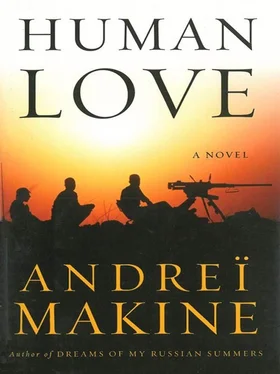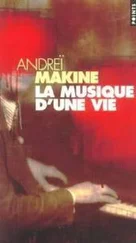Previously Ernesto’s speeches had given a semblance of logic to the endless treks through the forest, the gun battles, the deaths of young men who had lived so little. Such deaths did not seem pointless now, but rather directed toward a different destination, like the light of that constellation reflected in the eyes of the wounded soldier Elias gave a drink to. His lips were still moving under the trickle of water; the iris in his eyes caught the glittering of the night, then suddenly everything froze, the mouth, the eyelashes… As he closed his eyelids, it seemed to Elias as if these eyes still perceived the dark abyss of the sky more broadly than ever. This was the very first man he had kept company with as he died.
Defeat taught him a lot. One day, hidden in a thicket, he saw soldiers finishing off wounded men, watched by their commander, that soldier in a new uniform, the man he had thought capable of changing sides for more pay He had done so, and was now hunting down the diminishing number of rebels led by Elias’s father.
The rout had transformed his father as well. He was no longer the operatic revolutionary in his fancy uniform that made him look like a Portuguese officer. No, like the fighters he was trying to extricate from the encirclement, his father was russet with dust, bearded, his eyes reddened from lack of sleep, from the sun, and from stress. He had a limp in his left leg, hit by shrapnel, and the calf was swathed in dirty bandages.
Elias realized that before he came to the Congo, this was how he had pictured his father.
One evening, passing through a village, Elias caught sight of two women, one young, the other older, halfheartedly arguing as they prepared a meal. He stopped, struck by the similarity: this was an exact replica of what he had seen that very first day, on his arrival at the rebel camp. The same actions, the same voices, the same serenity. All of It perfectly Indifferent to Ernesto’s speeches, to the violence of the fighting, to the promises of a better world. These women’s happiness had nothing exalted about it, and yet happiness it was: the golden haze of the sunset on the road, the cries of the children among the huts, the smell of food and the cool breeze already filtering up from the river, the gentle lapping of the water beneath an oar… In a train of thought he did not succeed in following through to the end, he told himself that this happiness presented a greater threat to Ernesto’s revolution than any class enemy.
Finally there came a moment when the very thing that gave strength to their band on the run, the tie, the blood-soaked bond, became its principal flaw: together, they were easily identifiable; they needed to separate and, one by one, “blend in with the populace.” Elias remembered Ernesto instructing the soldiers in this technique.
He had already read, and would later read again, scenes in books of farewells between comrades in arms. These featured ringing turns of phrase, solemn oaths, tears choked back, and, if a loving woman was involved, long embraces interrupted only by the revving of engines. Their own parting had nothing melodramatic about it. They counted up and shared out the remaining ammunition, then did the same with the food and the scant medical supplies. His father, followed by several men, took up position between two hills to allow the others to move away safely to escape the commando units that maintained tight surveillance of the area. Elias did not even really have time to talk to him, and it was only the next day that the meaning of their separation became clear: impossible now to ask all the questions that had been slowly accumulating within him since his arrival in the Congo.
A week later this impossibility of talking felt like a suffocation. For he saw his father again.
Mingling with a group of peasants in flight from the fighting, Elias was standing on the high bank of a river and, like them, watching a boat as it traveled past. A man was rowing with all his strength to pull away from the shore, where soldiers were directing almost continuous gunfire at him. The grimaces of the men shooting could be made out clearly down below as they aimed long bursts in the direction of the boat. The face of the man in flight was clearly visible too: his mouth urgently gasping for breath, a vagabonds beard, that roll of bandages on the left calf – his father. A man about to be killed at any moment.
To prevent this death he would have had to throw himself from the top of the bank, roll down the slope, rush at the soldiers, and… And be killed by the first bullet. Elias remained motionless, hypnotized by the spurts from bullets hitting the water around the boat, as if in a random game.
The distance was already considerable; the shooting from the submachine guns lacked precision, the soldiers swore, got annoyed, their aim became even wilder. For a moment Elias believed, hoped with all his being, that his father was going to escape.
It was then that he saw the white man with a ginger mustache and red patches on his round face, smiling and dour at the same time. Of average height, stocky, his bowlegs in khaki shorts, he had the air of a professional irritated by the incompetence of amateurs. Unhurriedly, he set up the mount of his machine gun on the sand, cleared the sights, took a drag on his cigarette, and laid the stub down on a rock. Aimed, fired… And smiled condescendingly at the soldiers as they applauded him. In the distance the fugitive, struck in the head and throat, threw up his arms, let go the oars, fell backward. The boat continued in its course across the river, then began to drift. The ginger-haired man picked up his cigarette again, exhaled a slow curl of smoke.
When Elias had the strength to think, he told himself that his fathers death resembled the fall of a bird hit in mid-flight. He did not know why, but this image made his grief less appalling.
One of Ernesto’s promises was kept. Traveling via clandestine networks, then via Algeria and East Germany, Elias managed to reach Cuba. It felt as if he were traveling through time, toward an encounter with a dream that had already been realized, one that in Africa was barely beginning to put out shoots, nourished by endless tides of blood.
CUBA WOULD TEACH HIM THE USE OF WEAPONS, the science of revolution, the flesh of woman. Then one evening, in 1967, on a beach bathed in the sunsets copper light, he learned that Ernesto had met his end.
So it was that this death remained forever associated in his memory with the vivid blood-red clouds, the sleepy swell of the waves, and the tearstained face of the young Cuban woman who broke the news to him. Hair stiff with salt, lips on which he silenced her somewhat overartistic lamentation with a kiss: “Che is dead! The Americans have killed him…” Ernesto’s death mingled with the smooth warmth of the first body he had loved, now shaken with sobs.
Elias sensed the coquettish element in her grief. His girlfriend had met him to make love, to which she generally applied herself with fierce, healthy zest, wasting no time on emotional outpourings. The national hero’s death brought a new savor of drama to their encounter. Thanks to these slightly forced tears, he grasped that it was possible for love to be no more than two bodies taking pleasure, parting, tangling with each other again… Sometimes a few theatrical effects could add spice to this sweet physical fulfillment. Slivers of moonlight on the sea, tender little lies tickling an ear, the feeble death throes of a wave, the choking death throes of a guerilla in the Bolivian jungle…
He lay there beside the woman glowing with pleasure and was amazed as one of those thoughts struck him, simple enough to be almost banal in their aptness: So the revolution hasn’t changed any of this!
Читать дальше









